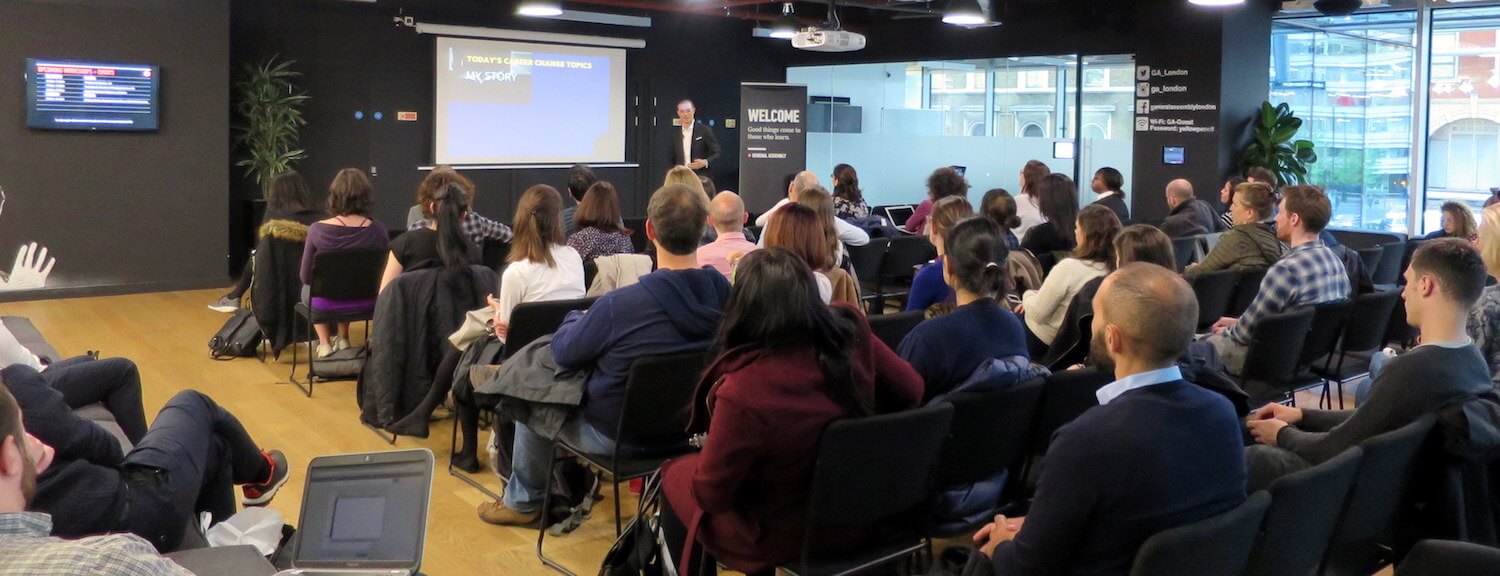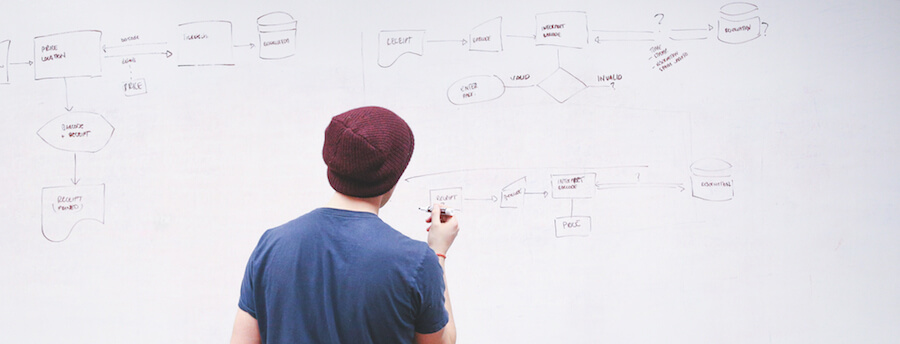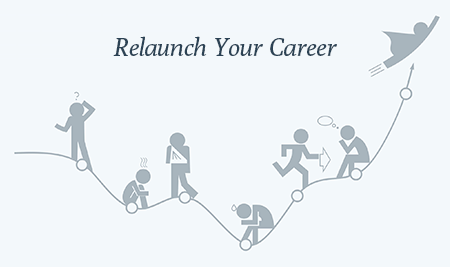Career change is often misunderstood. Whenever I’ve walked away from one job to pursue another, some people have called me a quitter. Others questioned whether I would ever figure out what I wanted to do. Still others were confused why I couldn’t just be content with the job I had, even if I didn’t love it.
In my experience, both with my own career changes, and after working with hundreds of other professionals who have chosen to change careers, people rarely change directions because they like the idea of quitting. People rarely make a career pivot because they enjoy life disruption. And people rarely leave a job because they weren’t grateful for what they had.
Most of the career changers I cross paths with make big changes in their career because they want to spend their days doing work they actually find meaningful. They grow tired of that nagging feeling that something’s missing. They move on because they realize that life is too short to spend most of your waking hours doing work you don’t truly care about.

In April 2017, I gave a talk at General Assembly in London entitled “Navigating the Emotions of Career Change.” During my talk, I shared my own personal story of career change, my 7 stages of career change roadmap, how to overcome barriers to change. In catching up with some audience members afterwards, I shared some career change myths that seemed to really strike a chord with those in attendance, so I wanted to share them here with you.
Myth 1: Career change is a logical, natural evolution

There’s really nothing natural about walking away from a stable, full-time job. Most of the time, if you’ve been professionally “successful,” that’s because you’ve invested years of time, energy, and education into getting to that point. On top of that, successfully climbing an organizational ladder creates professional momentum that exponentially builds over time. You eventually gain more responsibility, lead better projects, earn more money, build more credibility, and continue to land fancier job titles.
So the idea of walking away from all this investment is hardly logical. Changing careers is often not a natural move. Far from it. In fact, it often feels incredibly counterintuitive. Even if you reach a point where you’re feeling dissatisfied, moving on is often harder than holding on, something I talked about in my TEDx Talk, Reshaping the Story of Your Career.
Changing careers requires taking a brave leap into the unknown with the belief that something better awaits you, even though you may not be certain if this is even true. So letting go of what you already have can feel incredibly risky, even careless. Changing careers is also disruptive, no matter how you cut it. You’re often letting go of years of investment and walking away from the predictable, stable life you’ve created for yourself.
There are times when you need the courage to take a great leap. You can’t cross a chasm in two small jumps.
–David Lloyd George
Making a career change requires a bit of a leap of faith. A leap that may feel rather counterintuitive, but still feels right because you know deep down there must be a better way for you to be spending your work days. Ultimately, moving on from your current job means you’re taking a courageous step knowing that meandering off the beaten path is sometimes necessary to uncover a better way forward.
Myth 2: You must make a drastic change

When you mention the idea of career change to people, they often conjure up this image of someone storming into her manager’s office and declaring, “I quit!” Or someone abruptlypull of leaving his office job behind to go write a book in the woods. Or someone packing up and moving to a new city to start a brand new life and career.
Sometimes, it feels like the only solution to your career woes is to change everything, to start over from scratch. I’ve done this myself. I’ve walked away from a 10 year career path and started over, moved to an island to figure out what I wanted to do with my life, and relocated to a different country to address some aspect of dissatisfaction in my life. However, while these dramatic moves might make for a great stories, dealing with job dissatisfaction doesn’t always have to be so drastic.
This reminds me of a great lesson from Tony Robbins about how small changes can make a huge difference. About how you may only be 1 millimeter off from being where you want to be in life.
You may only be 1 millimeter off –Tony Robbins
Changing careers doesn’t mean you have to change everything in your job in order to be happy. Sometimes, it means making a small tweak. I once had a situation where I wasn’t happy with my job, but simply shifted from one project to another which made all the difference. Another time, I thought I disliked being in the marketing industry as a whole. But when I shifted brands, my passion for marketing was rekindled.
So if you’re not feeling happy with your career situation, and you don’t have the stomach to make a huge leap or drastic change, you may be able to “fix” things by making a tweak. I think of a job broadly being made up of 6 components: industry, company, function, role, culture, and geography. You may be able to improve your situation drastically by tweaking one of these things instead of all of them at once. In fact, an iterative approach can work really well if you’re trying to diagnose exactly what’s wrong.
Myth 3: Change creates a moment of triumph

We’ve all seen those blog posts where someone’s sharing a personal reflection on how making a big career decision led to complete fulfilment and total happiness. You hear these stories about overnight successes and people finally “making it,” once they discover their true passion!
Everyone loves a good reinvention story, right?
For example, I absolutely LOVE the movie Chef. Jon Favreau plays a head chef who quits his restaurant job to start his own food truck after getting fed up with not being able to cook the food he wants. I love how he decides to create a fresh start for himself. I love how he goes out on a limb, how his sous chef buddy from the restaurant swoops in to help him, how he rediscovers his passion for cooking, and how so many things fall into place for him after he makes the brave move. This movie is one of my all-time favorites. I watched it a few months after I made a similar decision to branch off on my own, so the movie really struck a chord with me.
Now, I actually do think a lot of career changes, when made for the right reason, can and do result in people being much more happier and fulfilled. When I left my corporate job to start my own business, the meaning, balance, and overall satisfaction in my life skyrocketed. And I actually do hear from people now who have admired the move I chose to make.
However, the unbeaten path can also be a very lonely one. For all the people who have commended me for making a career change, more questioned my decision when I was in the thick of making my move. While part of my professional circles stayed intact, others parts of it quickly disappeared. I experienced a lot of disenfranchisement from the professional networks, industry associations, and social groups I once belonged to when I was working as a full-time marketer.
The unbeaten path is often a lonely one.
Change is hard. It takes time, persistence, and a tremendous amount of patience. Having observed the trajectories of many people who have changed directions in their careers, reaching the point of true fulfillment or satisfaction can sometimes take years to achieve. And while making intentional, positive changes in your career can create significant improvements, rarely does a moment of triumph occur as the result of a single pivot or decision where the skies part and all is right with the world. Instead, it tends to typically happen after arduously paving out a new path, brick-by-brick, until you eventually turn a pivotal corner that’s only comes after many days, months, and years of consistent, hard work.
Myth 4: You must have a complete plan before you proceed

Sometimes, when you hear the career narratives of people who have relaunched their careers, it seemed like they had a really grand plan of how all the pieces would fall into place mapped out from the start. That makes sense, right? Making a career change is so daunting, so one way to mitigate the risk could be to create a solid plan from start-to-finish of how you’re going to get from where you are today to where you want to go.
I can definitely empathize with the idea of having a plan before you start a new endeavor. I’m much more comfortable having a plan vs. NOT having a plan. Whenever I’ve taken the Myers-Briggs personality survey as part of corporate team-building exercises, my test results have consistently, without fail, ranked me as the most extreme “J” (aka “Planner”) on my teams, a pattern that’s held true across three different companies and three different teams made up of people who already tend to skew toward being planners.
Unfortunately, the need to have an end-to-end, comprehensive career plan can actually create an insurmountable barrier to change. I see many career changers get caught up in a paralyzing chicken or egg spiral. On the one hand, someone wants to have a career path ironed out before making the move. But on the other, you have to sometimes test out that career path to know if it’s right or wrong. Therein lies the conundrum.
Also, creating a full-blown plan itself can be very daunting. It’s hard enough to figure out your next step, let alone your next 10 steps. Excess planning can sometimes get in the way of concrete progress.
You can’t connect the dots looking forward. You can only connect them looking backwards. You have to trust the dots will somehow connect in your future. –Steve Jobs
I’ve found that the people who end up being able to pull off a career change aren’t necessarily those who have it all planned out. Instead, they’re the people who decided to just start somewhere and proactively explore other routes, even if those initial explorations ended up not being 100% perfect or fruitful. This might mean taking an evening course, attending an online webinar, getting a professional certification, or starting up a side project as a way of testing the waters.
As John Maynard Keynes once said, “It is better to be roughly right than precisely wrong.” So when you know you’re in the wrong job, even taking a small step in broadly the right direction can create concrete progress that eventually enables the career change you’re seeking.
Career change is not easy, but it can be achieved

In the end, being able to separate these myths from reality allows you to be more prepared to deal with the real dynamics and challenges of making a career change. Simply being aware that change involves some serious bravery, tweaking as you go, some solitude at times, and the willingness to start somewhere without a fully mapped out plan is the first step toward being at peace with the thrilling and challenging journey ahead.
Hear more about these myths
You can watch my full talk at General Assembly, London to learn more about my own story of career change, the 7 stages of career change, these 4 myths, and enablers of change. The part where I talk more about these myths starts around 20:00.
Define what matters most to inform your next career move
Now that you’re aware of some of these career change myths, you’ll be in a better position to handle the realities of career change. To help you fully embrace with these realities, you can download my free “Tackling Career Change” worksheet that walks you through 4 key questions to answer so you can feel more comfortable with each of the four realities I’ve outlined here and move forward with your desired career change.
Register free to access resource
I’d love to hear what change you have planned, and what your next steps will be in the comments below. Good luck!




I really like how this article is structured! It outlines the many preconceptions people have with career changes, then inputs some reality on to what actually goes on. I wished I had this article to support myself after my personal career change, and to show it to all the naysayers I had to deal with.
I moved from stable job to creating my own business helping others with their careers. All the doubt, hardships, successes, and triumph left me with many new life experiences, I couldn’t be more happier. But I’d admit that it was tough, really tough. Personally, one of the most important things in on deciding a career change is to figure out WHY it is needed, and if you are ready to do whatever it takes to bring it to fruition.
Sometimes though, it doesn’t work out. I definitely seen cases of failure. What kind of advice do you think is best for those who failed?
Noah, I’m happy to hear you found this article useful. I know what you mean about naysayers. They pop up all the time, especially when you’re trying to something a bit unconventional. I also agree that change is very tough. If it was easy, I’m pretty sure everyone would be pursuing their dream jobs instead of just being content with day jobs they tolerate.
Failure’s always tough, and I’ve had my fair share of it myself. I suppose it depends on the nature of the failure, so my response to the “failure” question may come across as a bit broad without knowing more detail here, but broadly speaking when it comes to career change, I’d say that it’s worth taking a very honest look at:
I’m actually not one of those people who believes completely in the mantra “If at first you don’t succeed, try try again.” I believe in the idea of persistence, but I do think it’s worth reevaluating your target, your strategies, and your tactics to see what you can do differently the second time around if you want to keep working toward that same goal.
Feel free to let me know more details if you wish, and I can probably provide more provide perspective on it.
Great Article! I had a look at the worksheet. I’m there. I changed my career. I went from a 30 year career as a violinist and teacher with BA in Education, to BS in Health Information Administration with RHIA certification. I graduated in May. I believe I have done well– except that no one is hiring me. I would appreciate your insight.
Lisa, glad you found this article & my worksheet useful. Coincidentally, I used to play the violin myself for about 12 years of my childhood years. What sort of role are you now trying to land? Where exactly are you running into the barrier? Resume review? Cover letter? 1st round behavioral interview? 2nd round case/skills interview?